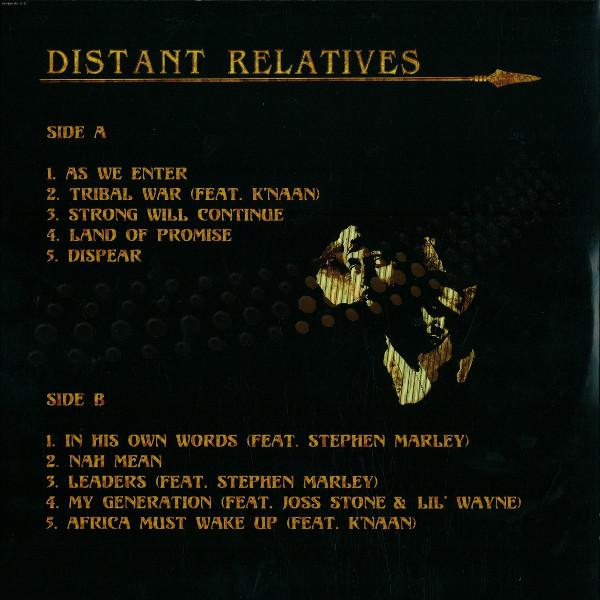

It’s a royal and a striking reminder of why these two artists have reached legendary status. Distant Relatives ( LP, Album, Unofficial Release) Not On Label (Nas), Not On Label (Damian Marley) JGONGLP002. Distant Relatives is this African contradiction explored further with hip-hop, dancehall, and by way of samples, jazz, and African music showing the way. The magical moment that explains it all comes in the form of an old Dennis Brown interview which is sampled for “Land of Promise.” Answering the question “What do you think of Africa?” Brown replies “Just to mention of it man, is like, you call mi name man” in a voice that displays a whirlwind of emotions, from the very best to the very worst.

Gong' Marley (executive producer), James Caruso (mixing), Chris Athens (mastering), Dan Dalton (manager), A. Featured peformers: Nas (executive producer), Damian 'Jr. Genres: Conscious Hip Hop, East Coast Hip Hop. Released on Universal Republic (catalog no. The majestic “Strong Will Continue” marches forth with a positive spiritual message, while “Count Your Blessings” is musically akin to Damian’s Bobby Brown collaboration “Beautiful” and father Bob's’s “One Love” lyrically. Distant Relatives, an Album by Nas & Damian Marley.

On the track, guest K’Naan offers the provocative “I drink poison/Then I vomit diamonds” while the devastating “Leaders” features Nas’ “Malcolm on the podium/Shells drop to linoleum/Swipe those/Place them on display on the Smithsonian.” Still, there’s much more hope and pride here than anger and darkness. Rapidly trading the lines (Nas): "I’ve got the guns"/(Damian): "I’ve got the Ganja"/(Nas): "And we can blaze it up on your block if you wanna” just raises the excitement level to a “Welcome to Jamrock” or “Nas Is Like,” but when the following “Tribes at War” creates a cinematic big picture of Africa crumbling while its people are unwillingly scattered across the globe, the album turns compelling. KRS-One (1988) Ifa by Tunji Oyelana and The Benders (1976). The duo worked to maintain the theme, which will contain samples from African music. The album’s content will heavily revolve around Africa, from ancestry and poverty. Actually, it all comes together in the album’s first few seconds as Marley and Nas loop a sample of Ethiopian jazzman Mulatu Astatke for “As We Enter”’s effective and infectious beat. Nah Mean by Nas and Damian Marley Kurikut by Sara Chaves (1964) Moshitup by Just-Ice feat. Distant Relatives is an upcoming collaboration album by American rapper Nas and reggae artist Damian Marley, scheduled to be released on April 20, 2010. However, from here on in, it’s plain sailing.The Nas and Damian Marley collaboration Distant Relatives came together as a way to earn money for schools in Africa, but before any corny “charity album” misconceptions get in the way, know that this is one purposeful monster and a conceptional bull's eye that fully supports its title. This is my main issue with aspects of the album – the music seems to have been occasionally neglected on these tracks in favour of overly didactic lyrics about the themes of the album. Leaders is a slightly on-the-nose plea for leaders to change the world, whilst simultaneously bemoaning how hard it is to achieve real change. The first song, As We Enter, is fine, with interesting lyrics and a nice music sample from Mulatu Astatke, the Ethiopian jazz king, which is an indication of one of the major themes of the album, Pan-Africanism. The Nas and Damian Marley collaboration Distant Relatives came together as a way to earn money for schools in Africa, but before any corny charity album misconceptions get in the way, know that this is one purposeful monster and a conceptional bulls eye that fully supports its title.

It’s pretty much exactly what it says on the tin, and at six minutes long, it’s about three minutes too long. Strong Will Continue is less interesting on both counts. 10 Disappointing Albums: 1 Nas & Damian Marley Distant Relatives. As I say, an interesting but overly didactic song, and not one I like to listen to. This section of the song refers to the state of the current world we live in, and how institutionalised racism has been keeping black people divided, but also about how gangs have caused much bloodshed and tragedy too.


 0 kommentar(er)
0 kommentar(er)
